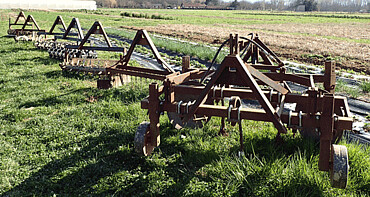Abstract
This case study presents an initiative for the development and innovation of alternative farming technology in the Global North. L’Atelier Paysan is a non-governmental organisation in France initiated in 2011 by a collective of small-hold farmers and organic farming activists. The co-operative supports alternative small-scale and organic farming communities and practices through technologies made by and for peasant farmers. L’Atelier Paysan posits that the current development of farming technology is led by agro-industrial firms and that their innovations do not necessarily meet the ‘real’ needs of farmers. In contrast, the co-operative advocates for ‘peasant autonomy’ through a bottom-up and decentralised innovation process. Peasant farmers and L’Atelier Paysan’s technicians work together to co-innovate, document and publish open access tutorials and guides on peasant-driven technologies. L’Atelier Paysan also organises training workshops in which peasant farmers can learn how to use, build and adapt these farming technologies. Along with its online website, these workshops are key spaces for knowledge sharing, collective work and critical thinking on farm machinery. Through the close examination of this grassroots organisation’s motivations and activities, the case explores some key aspects of frugal innovations, including knowledge production, knowledge sharing and innovation design.
Citation Note
Based on field research; 16 pages Follow the 'handle' link to access the Case Study on RePub. For EUR staff members: the Teaching Note is available on request, you can contact us at rsm.nl/cdc/contact/ For external users: follow the link to purchase the Case Study and the Teaching Note.
Objective
1. explain what constitutes a peasant-driven technology and analyse its relationships with frugal innovations; 2. explain bottom-up innovation processes and knowledge sharing of frugal innovations 3. identify access and property issues with technology development and innovation in agriculture
